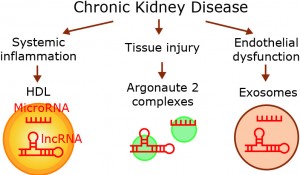Circulating noncoding RNA as posttranscriptional determinant of cardiovascular complications in CKD
Chronic kidney disease (CKD), with diabetes mellitus predominating its etiology (Diabetic nephropathy), is a leading cause of death due to cardiovascular disease. It is becoming increasingly apparent that global regulation of critical processes occur at the post-transcriptional level by non-coding RNAs (ncRNAs, including microRNAs and long noncoding RNAs). Despite their intracellular functions, ncRNAs are also present in the bloodstream carried by exosomes, the RNA-binding protein Argonaute2 (Ago2) or lipoprotein complexes such as high-density lipoprotein (HDL). We recently identified that total plasma levels of specific microRNAs and long noncoding RNAs were directly associated with CKD and vascular injury. Moreover, these systemic, circulating ncRNAs can be horizontally transferred to vascular cells thereby actively affecting their phenotype suggesting an active involvement in the pathophysiology of cardiovascular complications of CKD in a carrier-dependent manner. We believe that systemic conditions associated with CKD lead to a shift in the distribution of circulating ncRNAs (among exosomes, Ago2 and lipoprotein complexes) that promote a vascular injury prone phenotype. As such, we aim to determine 1) The impact of CKD on the distribution of circulating ncRNAs in exosomes, Ago2-ncRNA complexes and lipoprotein fractions in plasma from control subjects or CKD patients; 2) The function of specific ncRNA-carrier complexes on vascular integrity using in vitro and in vivo models of (micro)vascular injury; 3) Whether the distribution of ncRNA can function as biomarker for the development of cardiovascular complications in CKD patients. Our studies aim to contribute to a paradigm shift in the pathophysiology of cardiovascular complications of CKD showing that circulating ncRNA are not just by-products of disease progression but can play an active, however modifiable role in the regulation of vascular integrity. This work can directly impact the diagnosis, prevention of, or innovative treatment strategies for CKD-associated cardiovascular complications.



